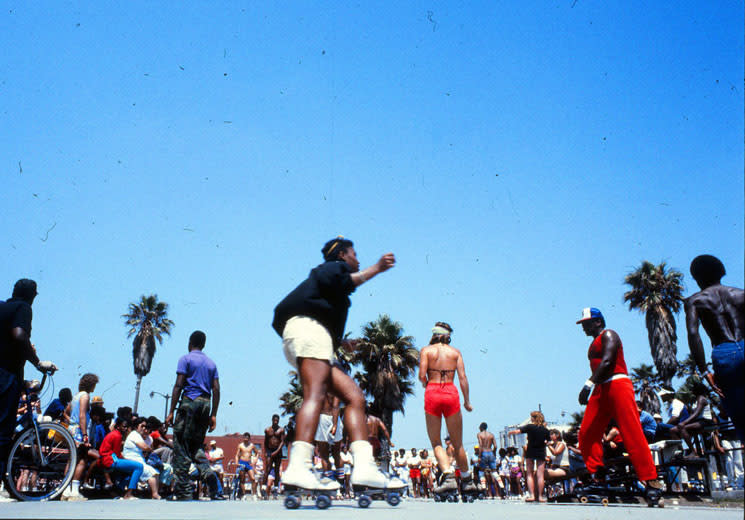Roller Dreams sneaks in a darker message underneath a veneer of candy-coloured '80s workout gear and breezy Californian nostalgia. It breaks apart a time-honoured American tradition, an emblem of a so-called "simpler time," to reveal how this tradition (as many do) displaces and dishonours the minority groups that were its pioneers. It's a familiar story, and a fascinating snapshot of a singular phenomenon in history with themes that especially resonate today.
Mixing archival footage and present-day interviews with members of the "O.G." skating community, Roller Dreams focuses on a group of roller skaters, mostly men and women of colour, who flocked to Venice Beach, CA in the 1980s to practice their moves in front of adoring crowds. Moonwalking, spinning and breakdancing to funk, pop and soul emanating from boom boxes, the skaters embraced their sport as not only a craft to perfect, but as a form of escapism from the often bleak realities of being a person of colour in America.
De-facto leader of the skating crew, the super-cool, deep-voiced, muscular "Mad," acted as an advocate for the community, protecting and uniting them in the face of race riots, poverty and discrimination. Skating was their passion, and their inspiration to work towards bigger and better things.
While roller skating is no longer as cool as it once was (although '80s and '90s nostalgia definitely is), the film smartly avoids the trap of becoming another doc about a niche retro trend by instead exploring issues of race, gentrification and appropriation. Roller skating, a pasttime rooted in, and popularized by, black youth culture, was eventually co-opted by Hollywood in order to capitalize on coolness. Repackaged for a white audience, and virtually erasing any hint of non-white skaters, roller movie after roller movie dropped: Roller Boogie, Skatedown USA, Xanadu. White-owned businesses began popping up in this predominantly black neighbourhood. Finally, perceiving this group of minority youths as suspicious, police began to harass skaters on Venice Beach, first banning loud music in public, then tearing up the patch of asphalt where they practiced altogether. The roller skating scene was, effectively, dead.
It's a sad ending to a subculture that featured an incredible amount of skill on display, and director Kate Hickey uses plenty of sunny archival footage to demonstrate just how smooth these skaters' moves were. But it doesn't shy away from the realities of how this scene died, and how white supremacist culture had a hand in its demise.
(Aquarius)Mixing archival footage and present-day interviews with members of the "O.G." skating community, Roller Dreams focuses on a group of roller skaters, mostly men and women of colour, who flocked to Venice Beach, CA in the 1980s to practice their moves in front of adoring crowds. Moonwalking, spinning and breakdancing to funk, pop and soul emanating from boom boxes, the skaters embraced their sport as not only a craft to perfect, but as a form of escapism from the often bleak realities of being a person of colour in America.
De-facto leader of the skating crew, the super-cool, deep-voiced, muscular "Mad," acted as an advocate for the community, protecting and uniting them in the face of race riots, poverty and discrimination. Skating was their passion, and their inspiration to work towards bigger and better things.
While roller skating is no longer as cool as it once was (although '80s and '90s nostalgia definitely is), the film smartly avoids the trap of becoming another doc about a niche retro trend by instead exploring issues of race, gentrification and appropriation. Roller skating, a pasttime rooted in, and popularized by, black youth culture, was eventually co-opted by Hollywood in order to capitalize on coolness. Repackaged for a white audience, and virtually erasing any hint of non-white skaters, roller movie after roller movie dropped: Roller Boogie, Skatedown USA, Xanadu. White-owned businesses began popping up in this predominantly black neighbourhood. Finally, perceiving this group of minority youths as suspicious, police began to harass skaters on Venice Beach, first banning loud music in public, then tearing up the patch of asphalt where they practiced altogether. The roller skating scene was, effectively, dead.
It's a sad ending to a subculture that featured an incredible amount of skill on display, and director Kate Hickey uses plenty of sunny archival footage to demonstrate just how smooth these skaters' moves were. But it doesn't shy away from the realities of how this scene died, and how white supremacist culture had a hand in its demise.
